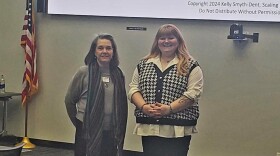-
Congressman Darin LaHood is not breaking entirely with the Trump administration on the vaccine question — even while acknowledging he now has more than just concerns.
-
U.S. Rep. Darin LaHood praised the Trump administration immigration policy and efforts to deport criminals, while expressing reservations about conduct toward children and warrantless searches.
-
Some McLean County Board members are criticizing Health Department inspectors over how they address the presence of beverages containing CBD or THC additives. The situation has already caused on again, off again enforcement on hemp-derived drinks.
-
A big chunk of the counselors and social workers in McLean County just got trained in a rising therapy model that can help people overcome anxiety, depression, and PTSD. It's called Eye Movement and Desensitization and Reprocessing, or EMDR.
-
Illinois is among a growing list of states that are issuing their own vaccine guidelines that could supersede those of the federal Centers for Disease Control and Prevention.
-
Abby Tighe was fired from her "dream" job in overdose prevention at the Centers for Disease Control in February. That's when the Trump administration fired all probationary workers at the health agency.
-
After the Trump administration slashed billions in state and local public health funding from the federal Centers for Disease Control and Prevention earlier this year, the eventual impact on states split sharply along political lines.
-
Three McLean County ZIP codes are among the 180 added to the state’s list of areas considered at high risk for childhood lead exposure, including 61761 in Normal.
-
Hundreds of workers will lose their jobs as Champaign-based Health Alliance plans to cease operations by the end of the year.
-
Kwame Raoul called the abrupt termination of funds earmarked in Illinois for wastewater surveillance, laboratory investments and boosting the public health workforce “both callous and unlawful.”
Play Live Radio
Next Up:
0:00
0:00
Available On Air Stations










